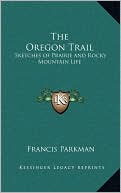

 |

|

The average rating for The Oregon Trail: Sketches of Prairie and Rocky Mountain Life based on 2 reviews is 3 stars.
Review # 1 was written on 2012-03-05 00:00:00 Ken Burton Ken BurtonIn my little book reviews I'm always coming back to this idea of sympathetic imagination. Sympathetic imagination, for me, is the ability to put oneself in another person's place, to imaginatively enter into someone else's mind and perspective. Exercising sympathetic imagination means withholding judgment, extending charity, allowing - either by stepping forward or by not retreating - the gap that separates us from others to close at least a little bit. It's the stuff of cliché (walking in another's shoes, seeing through another's eyes, etc.) but without it life and art are unbearable. It's not always easy. Sometimes the effort is exhausting. When it comes to the exercise of sympathetic imagination in reading, it helps when the prose is pleasant and the story a good one. Because characters can disappoint. Francis Parkman's autobiographical The Oregon Trail is a nice example of what I mean. Fresh out of Harvard, the young Parkman and his friend Quincy Shaw set out in 1846 for the Great Plains. From St Louis they move upriver with a revolving cast of emigrants, trappers, traders and wilderness guides. At Fort Laramie, in what's now eastern Wyoming, Parkman sets out with a band of Sioux for the Black Hills. He lives with them, hunts with them, eats with them, and smokes with them, for two months. Parkman explains that he's had a lifelong fascination with the Indians. As an historian, he would go on to spend most of his career analyzing the story of their relations with the French and British colonists. In order to experience the life of aboriginal Americans in an uncivilized state, he's travelled halfway across the continent. It's remarkable, then, how little curiosity he exhibits. To him, the Sioux in whose company he's living are (for the most part) unenlightened savages. He frankly considers them stupid, cruel, stubborn, backward. He doesn't ask, or doesn't think worth reporting, much of what they have to say about the world and their place in it. What does the universe look like to the Sioux in the summer of 1846? Parkman doesn't explore the question deeply. By the time he's making his retreat to St Louis at summer's end, you get the idea that he's sick to death of Indians and will cheer on their eventual genocide. That's probably putting it too strongly, but the fact is that Parkman's sympathetic imagination utterly fails him. And not only with regard to the Indians. The white man (preferably Anglo-Saxon and Protestant) he considers the paragon of creation. The Indians he places lower; but lower still (he explicitly states), are most of the unlettered French Canadian mountain men, the Mexicans with whom the United States has just entered into war, and the Mormon "fanatics" on their way over the mountains where, Parkman speculates, they'll try to forge a Californian empire. (The perfect vermin of the earth for Parkman, however, isn't human at all. It's the buffalo. I'm not going to suggest that he owes the beasts the same debt of sympathy he owes his fellow man, but his unrelenting campaign of bloodlust against the buffalo - especially on the return trip - gets hard to stomach.) Herman Melville, reviewing the book a couple years after its publication, gives Parkman a righteous chastisement for his lack of curiosity and fellow-feeling. Melville in his own masterpiece goes to some length (especially considering the era) to avoid the same pitfall. His Tashtego and Queequeg are fully realized and fully sympathetic men, equal heirs and possessors of earth and sea with Ishmael himself. However, as Melville says once he's put away the stick, Parkman's book is nonetheless successful, wonderfully so, full of fascinating observations of frontier and wilderness life, hilarious and pitiful anecdotes and vignettes, gritty character sketches and reportage. Parkman is a good writer and the story he tells is utterly fresh and bracing. Despite its flaws, The Oregon Trail is a real "treasure" of American letters and history. There's less sympathy than we might have hoped for, yes, but thankfully there's even less sentimentality. In the end, Parkman's limitations don't let us off the hook. It becomes necessary for us to exercise our sympathetic imagination, as readers, for the benefit of Parkman, who so frequently fails to exercise his own for the benefit of his subjects. |
Review # 2 was written on 2013-05-11 00:00:00 Heidi Schneeveis Heidi SchneeveisI was disappointed in this book. I had highly anticipated reading this book for several years. I had the impression it was about a journey from Missouri to Oregon or California on the Oregon Trail. The author only traveled perhaps half of the trail and did not comment or even mention the iconic landmarks like Chimney Rock. Or what it felt like to ride in a Conestoga Wagon. Rather the author regaled us with reasons why the "white" man was so superior. Indeed he ranked in order men of the prairie thusly: 1. Whites 2. Indians. 3. Mexicans. Gave a biased snap shot of life on the prairie and demonstrated why there are no buffalo left: they were all shot- some for sport and trophies; some for food. The Native Americans depended in them to live. The book shows the beginning of the destruction of the prairie and the beginning of the displacement if the Native American. |
CAN'T FIND WHAT YOU'RE LOOKING FOR? CLICK HERE!!!